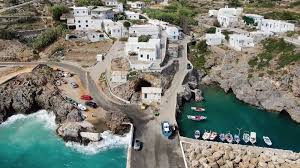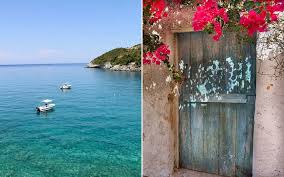Greece Antikythera Island: The Peaceful Paradise at the Edge of the Aegean Sea

Athens: Life on the isolated Greek island of Antikythera, lying at the edge of the Aegean Sea between Crete and the Peloponnesian Peninsula, can be tough if the supply boat does not arrive, as often happens during the winter.
Almost all the things which the few dozen permanent residents need to live on the island arrive by boat, including food and gas for the handful of vehicles there.
“Sometimes, when the sea is rough, it is impossible to approach the port,” says Panagiotis Pavlakis, the sub-lieutenant of the ferry that brings essential supplies to the tiny outpost.
But for the local people, the island is more than worth all this trouble. It is an earthly paradise. “There is no other place in the world where you can find such absolute peace and quiet,” says Giannis Tzinakos, a retired Greek Air Force general, who now spends most of his time on Antikythera.

The aging population has seen the village shrink to just twenty residents, with the school, previously shuttered for twenty-four years, only opening again last year after a young family with children moved to the island.
To help increase the population, the island has launched a campaign in conjunction with the Orthodox Church to entice people to move to the island paradise and make it their home.
There is one lone kafeneion (coffee shop), which remains open throughout the year and also serves as a grocery store, and perhaps even more importantly, as a meeting place for the islanders. The local hostel, comprised of fifteen rooms, is also available for visitors to Antikythera.
During the summer months, life returns again to Antikythera, as people with roots on the island return on vacations from faraway places—Australia, in particular, to which many local people emigrated in the mid-20th century.
A few tourists from Greece and abroad also choose the island as an ideal destination for quiet vacations.

Antikythera is characterized by a rare, wild beauty, with low hills, rich flora, and fauna, picturesque country chapels, and caves. There are many ancient paths, which provide for unique walks and longer excursions on foot.
There are also some beautiful, isolated sand and pebble beaches on Antikythera, not to be missed by anyone desiring to really get away from it all.
The most popular are Xeropotamos and Kamarila, a short distance away from the port and main village called Potamos.
The history of the island goes far back into time immemorial. Antikythera’s first inhabitants are thought to be people called the Dolopes, who were then followed by the Dryopes and the Cretans.
The Roman conquerors were known to banish their unwanted and unsubdued subjects to Antikythera while, later on, the island served as a lair for pirates.
Despite all its charm and splendid isolation, the island of Antikythera is best known for being the site of two of the most remarkable archaeological discoveries made in the twentieth century.
In the early years of the century, two bronze objects of extraordinary archaeological value were recovered from the sea off Antikythera: the famous “Youth of Antikythera” from 340 BC, which was found in 1900 by sponge-divers, and a mechanism, or machine, used for astronomical and calendar calculations from around 80 BC, which was found in 1901 by divers exploring a nearby shipwreck.
These two priceless objects from Greek history, both gifts from this tiny Greek island at the edge of the Aegean, are displayed in the National Archaeological Museum in Athens.





